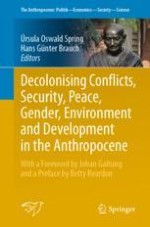2021 | OriginalPaper | Chapter
17. Governance by Violent Non-state Actors as a Challenge to Sustainable Peace in Brazil
Author : Marcos Alan S. V. Ferreira
Published in: Decolonising Conflicts, Security, Peace, Gender, Environment and Development in the Anthropocene
Publisher: Springer International Publishing
Activate our intelligent search to find suitable subject content or patents.
Select sections of text to find matching patents with Artificial Intelligence. powered by
Select sections of text to find additional relevant content using AI-assisted search. powered by
